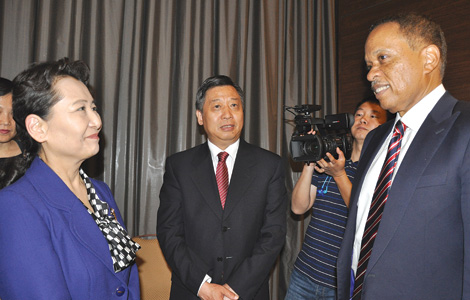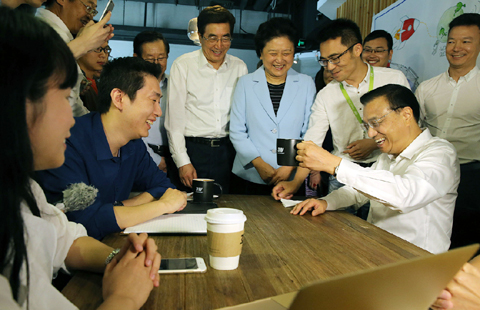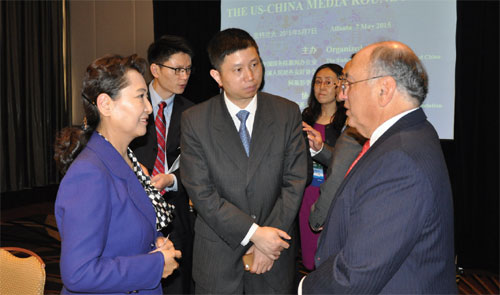Media's role called crucial
Updated: 2015-05-08 10:58
By Dong Leshuo in Atlanta(China Daily USA)
|
||||||||
|
From left: Cui Yuying, vice-minister of the State Council Information Office; Zhang Hongbin, deputy director-general of International Affairs Bureau at State Council Information Office; and Charles M. Firestone, executive director of Communications and Society Program and vice-president of the Aspen Institute at The 1st US-China Media Roundtable in Atlanta on Thursday. [Photo by Dong Leshuo / China Daily] |
The media play a crucial role in the development of bilateral and cultural relations between China and the US. That was the consensus of an inaugural Sino-US media discussion on Thursday.
"Media is the window for the Chinese and American people to know each other, and is the bridge and bond that the two sides communicate through," said Cui Yuying, vice-minister of the State Council Information Office of China. "In that, the media plays a critical role in the development of the bilateral relations of the two countries."
Cui spoke at the first Sino-US Media Roundtable in Atlanta, at which 30 media professionals from the two countries discussed media issues in the building of a new great-power relationship.
"The relations between the two counties lie in the people, and the relations between the people lie in connections," Cui said.
The roundtable was organized by the State Council Information Office and the Chinese People's Association for Friendship with Foreign Countries, with the support of the Aspen Institute and the China-United States Exchange Foundation.
"The media have the greatest influence in affecting how our respective countries will act," said Charles M. Firestone, executive director of the Communications and Society program at the Aspen Institute. "We have the opportunity to lead our countries, and indeed our citizens, to global peace, prosperity and stewardship by fostering transparency, accountability and honesty."
"We all come here with the purpose of strengthening US-China relations," said Jeff Moon, vice-president of Dolby Co, who was formerly the US consul general in Chengdu.
"None of the world's important opportunities or challenges can be addressed properly without cooperation between China and the US," Moon said. "So there is an urgent need for us to find areas for cooperation and trust."
Participants watched the film Touching the Tigers, a 40-minute documentary produced by Madame Li Xiaolin, president of the Chinese People's Association for Friendship with Foreign Countries.
The film tells the story of an American Flying Tigers pilot, Lt Glen Beneda, who was shot down in his fighter plan and wounded while defending China from Japanese forces during World War II. Beneda was rescued by Chinese farmers and soldiers and escorted to a US air base, where he received aid and developed an unforgettable bond with the Chinese people.
Malcolm Clarke, a director and producer who has won two Academy Awards, is going to reshape the documentary and try to get the film nominated for an Oscar.
"It is important to understand that huge friendship (between China and US) existed in the Second World War," Clarke said. "We need to see China stepping up and being proud of its culture and heritage."
"The media in China and the US should enhance the communication and collaboration, tightly seize the mainstream and directions of the bilateral relations of the two countries, respect the core interests and concerns of their own countries, be frank, active and transparent" and demonstrate good will, objectivity and rationality for the rapport between the countries, Cui said.
"As long as we start taking actions to build mutual trust in communication and to realize (the) win-win in collaboration, we will be able to continuously create a better future for Sino-US cooperation in the media," Cui said.
leshuodong@chinadailyusa.com

 Media players discuss bilateral role
Media players discuss bilateral role
 Beijing female pilots ready for takeoff
Beijing female pilots ready for takeoff
 Premier meets with group of innovators over coffee
Premier meets with group of innovators over coffee
 A glimpse of last rehearsal for V-Day parade
A glimpse of last rehearsal for V-Day parade
 Unusual but true: Breast milk ice cream just in time for royal baby
Unusual but true: Breast milk ice cream just in time for royal baby
 Candlelight vigil held for victims in Nepal earthquake
Candlelight vigil held for victims in Nepal earthquake
 Across Canada (May 8)
Across Canada (May 8)
 Ten photos you don't wanna miss - May 7
Ten photos you don't wanna miss - May 7
Most Viewed
Editor's Picks

|

|

|

|

|

|
Today's Top News
Media's role called crucial
Memory of Flying Tigers honored
Economic projects assist 'Belt and Road Initiative'
Chinese team helps heal Nepal
Joint anti-graft push needed, US delegates told
US NSA's phone spying program ruled illegal by appeals cour
US to launch federal probe into Baltimore police practices
AIIB 'backfired' on
US: Expert
US Weekly

|

|







